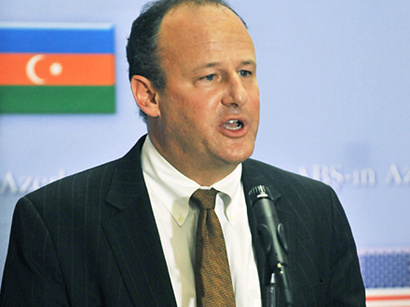U.S. welcomes Azerbaijan, Armenia dialogue

By Sara Rajabova
A U.S. official said his country is encouraged by the resumption of dialogue between Azerbaijan and Armenia, calling it critical for putting an end to the Nagorno-Karabakh conflict.
The remarks were made by U.S. Deputy Assistant Secretary of State for European and Eurasian Affairs Eric Rubin at a press conference in Baku on December 5.
"In the statement on the meeting of the presidents of Azerbaijan and Armenia, we noted that we welcome the determination, courage, and wisdom of the presidents in this regard," Rubin said.
As a Minsk Group co-chair country, the U.S. will continue to do everything in its power through co-chair James Warlick to increase the chances of achieving a settlement, Rubin said.
He also said the U.S. will try do everything it can in the coming year to help settle the conflict.
The U.S., along with Russia and France, has long been working to broker a solution for the long-standing Nagorno-Karabakh conflict through the Minsk Group, but their efforts have been largely fruitless so far.
The Nagorno-Karabakh conflict emerged in 1988 when Armenia made territorial claims against Azerbaijan. Since a lengthy war in the early 1990s that displaced over one million Azerbaijanis, Armenian armed forces have occupied over 20 percent of Azerbaijan's internationally recognized territory, including Nagorno-Karabakh and seven adjacent regions.
Rubin also said the U.S. is looking forward to the further development of security and defense relations with Azerbaijan.
He said he was glad to be back in Baku and had very good meetings with Azerbaijani friends and partners, and they look forward to continuing discussions in the weeks and months ahead.
He went on to add that the U.S. has great hopes for the accomplishment of the tasks related to building strong relations and contributing to the security and prosperity of people of both countries in the next year.
Rubin also spoke about his meeting with Azerbaijan's Defense Minister Zakir Hasanov, saying the U.S. looks forward to the further development of security and defense relationships with Azerbaijan, and hopes to build a partnership with the Defense Ministry.
Bringing peace and stability to Afghanistan
Rubin said the U.S. is deeply grateful to Azerbaijan's people and government for their efforts in bringing peace and stability to Afghanistan.
He said Azerbaijan plays a very important role as a key ISAF partner in facilitating land and air transit to and from Afghanistan.
Rubin went on to say the U.S. believes that Azerbaijan will continue playing an important role also after the completion of the mission in Afghanistan in 2014 and help all the countries involved, as well as train and prepare the Afghan military and security forces.
"We believe that military transit to and from Afghanistan will continue for quite some time and the number of missions will decline. This is an important opportunity for Azerbaijan to realize its ambitions and vision, and share it with the neighboring countries," Rubin said.
He noted that participation in such projects will have a positive affect on Azerbaijan's development.
Azerbaijan is among the eight partner countries that have confirmed their presence in Afghanistan after 2014. Peacekeepers of the country will stay in Afghanistan after the withdrawal of U.S. troops from the country by the end of 2014. However, Azerbaijan will reduce its presence in Afghanistan after 2014.
The Azerbaijani peacekeeping contingent in Afghanistan doubled in 2009. Currently, some 90 Azerbaijani servicemen are serving in ISAF. A company and then a battalion of peacekeepers were established as part of the Azerbaijani armed forces in 1997.
Azerbaijan has decided to broaden its activities in Afghanistan's non-military areas. Real cooperation began with Afghan specialists' training in mine sweeping. The preparatory works are underway on Azerbaijani military doctors' activity in Afghan hospitals, education of Afghan people at medical universities, participation of medical personnel in Azerbaijan's educational courses, Afghan military personnel's participation in educational courses at the military academy and other military schools, and Afghan students' education in Azerbaijan.
Here we are to serve you with news right now. It does not cost much, but worth your attention.
Choose to support open, independent, quality journalism and subscribe on a monthly basis.
By subscribing to our online newspaper, you can have full digital access to all news, analysis, and much more.
You can also follow AzerNEWS on Twitter @AzerNewsAz or Facebook @AzerNewsNewspaper
Thank you!
